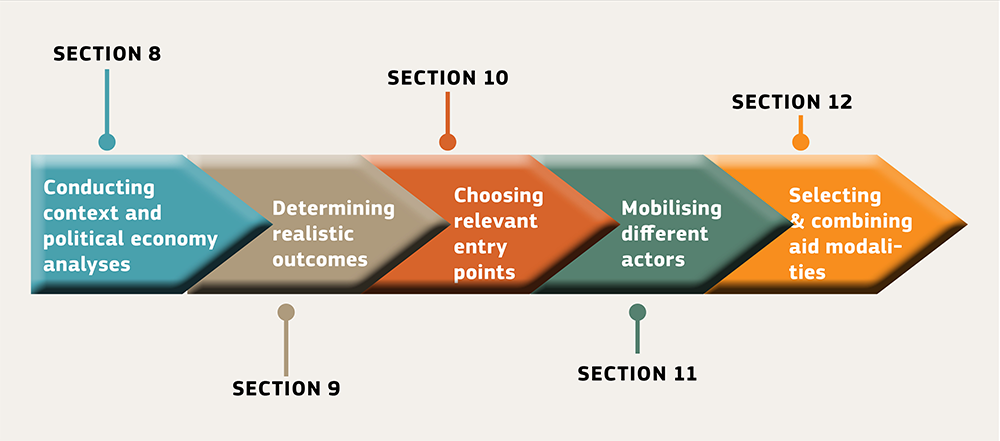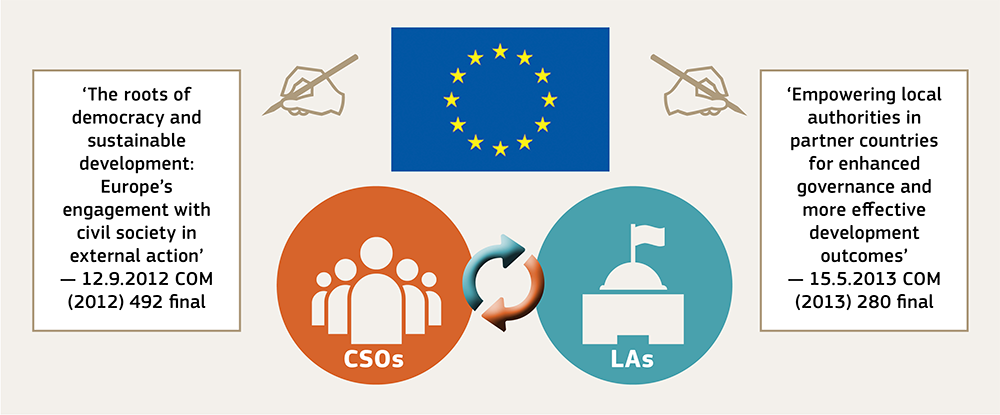4.4 Mobilising key actors in the promotion of territorial development
Developmental LAs occupy a strategic position in bottom-up processes of territorial development, taking into account their general mandate and legitimacy to act as catalysts and honest brokers. If they display local leadership and make effective use of windows of opportunity, they can make a difference in terms of development. Yet they cannot do the job alone.
Other actors have equally crucial roles to play and may therefore qualify as EU partners, provide complementary channels for aid, and bring to bear their comparative advantages in the design and implementation of DLGTD-supporting operations. Three sets of actors are of particular importance: (i) national, regional and global associations of LAs (ALAs), (ii) CSOs and (iii) European local and regional authorities engaged in decentralised cooperation.
How EUD can support associations of local authorities (ALA) fostering LAs that engage in territorial development
ALAs across the world have taken steps to assume their dual role of advocacy and capacity building in support of developmental LAs and territorial development. EU delegations can support these ALAs who are:
-
recognising the specificity of territorial development as well as its relation to national/global development efforts, including the pursuit of the SDGs;
-
advocating for the role of LAs in managing territorial development;
-
documenting success stories in promoting territorial development;
-
raising awareness and developing LA capacities;
-
partnering with donor agencies by systematically voicing LA concerns in national level policy and political dialogue processes;
-
offering new and complementary channels for external aid to support the emergence of developmental LAs.
In this context, the EU could engage in a strategic partnership with ALAs demonstrating that both partners share a vision and mutual interest in empowering LAs as developmental actors. These new types of partnerships can take the shape of Framework Partnership Agreements (FPA).
How EUD can support local civil society to empower LAs and foster territorial development
Civil society and citizens have a critical role to play in constructing the local political space and influencing the local political process for better development and governance outcomes. That is where strategic EU support to CSOs as governance actors is vital. Several EU delegations have used their civil society roadmap to identify ways and means to promote joint action between LAs and CSOs for example by:
-
promoting access of local communities to their LA’s resources rather than to external funding sources;
-
supporting a flow of information on what actually happens within the local public sector;
-
promoting debates on policies, priority programmes, quality of service delivery;
-
supporting the testing out and the elaboration of new local governance practices that may help coproducing new local governance tools and strengthen the level of trust between actors.
How EUD can link with European regions and municipalities involved in decentralised cooperation
Among the different type of partnerships resulting from decentralised cooperation, the direct decentralised cooperation:
-
is a structured, reciprocal partnership being an emanation of a municipal external policy;
-
emphasises the need to construct more egalitarian, long-term partnerships between municipalities with a view to tackling common agendas confronting their societies and territories through structured, reciprocal exchanges of knowledge and expertise;
-
goes beyond the LA itself and seeks to mobilise all relevant actors from the respective territories — the local private sector, civil society, universities, specialised agencies, professional associations, etc.
The core added value of direct decentralised cooperation programmes lies in support to improving the local development management cycle because they
-
help put in practice the mandate of LAs as catalysts of local development;
-
trigger innovations in the way LAs plan and finance their local development strategies and organise themselves to ensure effective implementation.
The operational challenge for EU delegations in promoting the developmental role of LAs through various instruments is to identify promising decentralised cooperation activities in the territory and seek to join forces with the European LAs.
|
To go further... read this
|
|
To go further... watch this
|


